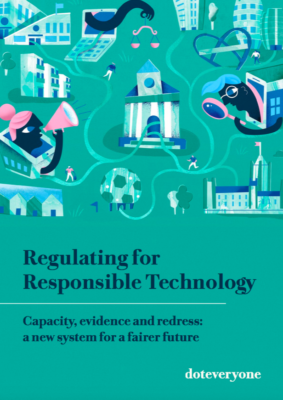Supporting consumers to seek redress from digital harms

Our recent report: Regulating for Responsible Technology: Capacity, Evidence and Redress, provides recommendations for how the UK can build a robust and flexible regulatory system to thrive now and in the future.
The thinking behind these recommendations is based on in-depth research, an open consultation and the generous input of many. This included Ombudsman Services and here, David Pilling, their Head of Policy and Lobbying, explains why we need independent oversight of the internet to ensure technology is used responsibly and so that consumers can access redress from digital harms.
The digital revolution has transformed how consumers live, shop and interact. It has delivered countless benefits in terms of convenience, speed of service, customer experience, accessibility and personalisation.
Not that long ago, the idea of ordering a product using a voice-activated, internet-connected device in your home, for next-day delivery, would have seemed the stuff of science fiction. Now, it’s normal.
Such advancements have, of course, come at a price. That price is our personal data, which has been used (and sometimes abused) by the big tech companies and all kinds of other businesses and organisations.
Concerns over privacy and data security are becoming more widespread amongst consumers, owing in no small part to recent scandals such as that involving Cambridge Analytica and Facebook.
At the same time, more conventional concerns such as access to redress in the event of shoddy service or a faulty product perhaps aren’t as prominent as they are in the offline world.
What happens when something goes wrong? What protection is available for consumers?
Currently, the answer is sometimes very little. Technology has outpaced regulation and legislation, which means many new and innovative businesses are able to operate without much oversight — potentially leaving consumers exposed.
This is a key theme of our recent Ending Consumer Detriment report, which looks at the rise of online-only businesses such as switching services or consumer-to-consumer sales platforms like eBay, Etsy and Shpock.
These disruptor sites have become part of our everyday lives but can fly under the radar when it comes to regulation and redress.
The challenge for policymakers is to ensure regulation keeps up with technological change — and in fact stays one step ahead.
Advocacy and support groups that seek to protect consumers from harm face a similar challenge to stay relevant in a world where these harms evolve every day. The same is true for ombudsman schemes and dispute resolution providers.
What all of this comes down to is responsible technology — a cause that Doteveryone is rightly championing.

We at Ombudsman Services were pleased to be able to contribute to the recent report on the topic and look forward to working with Doteveryone and other relevant organisations in pursuit of a regulatory system that informs, empowers and protects consumers as they go about their digital lives.
Whether this means the creation of a new body (as proposed in the report) or some other route, it’s clear that some form of independent oversight of the internet is needed to ensure technology is used responsibly and that consumers can access redress.
Quite simply, for the sake of consumers, technology cannot be allowed to outpace regulation.
If you’re interested in these issues and want to meet with others to discuss how we can better support people to seek redress from digital harms, join Doteveryone and Resolver at Yes to Redress!
The first in a series of informal meet-ups will be at at Resolver’s offices (56 Ayres St, London SE1 1EU) on Wednesday 5 December, 6.30–8pm.
Click here for more information and to sign up.
Supporting consumers to seek redress from digital harms was originally published in Doteveryone on Medium, where people are continuing the conversation by highlighting and responding to this story.